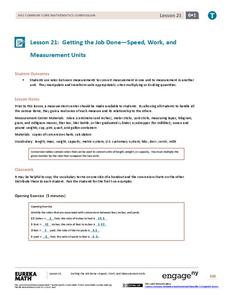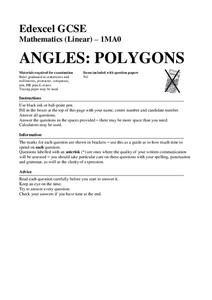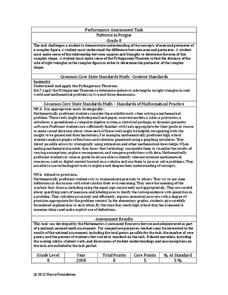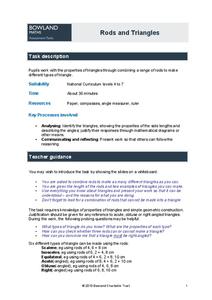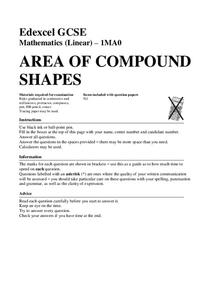Mathed Up!
Metric and Imperial Measures
After watching a brief video on making metric conversions to standard units, pupils complete tables to describe certain items with the appropriate unit of measurement. Then, they convert liters to millimeters, millimeters to...
EngageNY
Getting the Job Done—Speed, Work, and Measurement Units
How do you convert from one measurement to another? Pupils use unit rates to convert measurements from one unit to another in the 21st segment in a 29-part series. They convert within the same system to solve length, capacity,...
Illustrative Mathematics
Are These Right?
Is that a right triangle or a wrong triangle? Young mathematicians look at eleven different shapes and use a measuring tool of their choice to determine which triangles have right angles. Consider cutting out sets of the shapes to...
Concord Consortium
Square-Ness
Are there some rectangles that are more square than others? A thought-provoking task asks individuals to create a formula that objectifies the square-ness of a set of rectangles. They then use their formulas to rank a set of...
Illustrative Mathematics
Who is the Tallest?
A simple question, with a not-so-simple answer. Working with whole and mixed number measurements in inches, feet, and yards presents a problem with many possible solutions. A great activity that challenges the minds of young...
Noyce Foundation
Which is Bigger?
To take the longest path, go around—or was that go over? Class members measure scale drawings of a cylindrical vase to find the height and diameter. They calculate the actual height and circumference and determine which is larger.
Mathed Up!
Angles
What does a geometric farmer drive? A protractor, of course! A set of assessment worksheets prompts learners to use a protractor as they measure angles, name angles, and identify lines. Use the video as a way to...
EngageNY
An Exercise in Creating a Scale Drawing
Design your dream classroom. The lesson plan contains an exercise to have teams create a scale drawing of their dream classroom. Pairs take the measurements of their classroom and furniture and create a scale factor for them. To finish...
Noyce Foundation
Parallelogram
Parallelograms are pairs of triangles all the way around. Pupils measure to determine the area and perimeter of a parallelogram. They then find the area of the tirangles formed by drawing a diagonal of the parallelogram and compare their...
Mathed Up!
Angles in Polygons
Show your class that finding angle measures is a regular calculation with a resource that provides 12 problems dealing with the measures of angles in regular polygons. Pupils use formulas for the sum of measures of angles in a polygon to...
Noyce Foundation
Sewing
Sew up your unit on operations with decimals using this assessment task. Young mathematicians use given rules to determine the amount of fabric they need to sew a pair of pants. They must also fill in a partially complete bill for...
Inside Mathematics
Archery
Put the better archer in a box. The performance task has pupils compare the performance of two archers using box-and-whisker plots. The resource includes sample responses that are useful in comparing individuals' work to others.
Mathed Up!
Angles: Parallel Lines
Viewers are presented with seven problems with parallel lines and angle relationships and must use the given information to find the measures of specific angles. To finish, they explain their process in finding the measures in the...
Mathed Up!
Angles in Triangles and Quadrilaterals
This short video show viewers how to connect the sum of the angles in a triangle to other angle measurements. Pupils determine the missing measures for angles involved with triangles and quadrilaterals. Class members then must explain...
Mathed Up!
Stem and Leaf Diagrams
Order the data within a stem-and-leaf display. Pupils take data and create and ordered stem-and-leaf diagrams, including the key. Participants take their data and determine answers about the information. Class members then find...
Inside Mathematics
Patterns in Prague
Designers in Prague are not diagonally challenged. The mini-assessment provides a complex pattern made from blocks. Individuals use the pattern to find the area and perimeter of the design. To find the perimeter, they use the Pythagorean...
Bowland
Rods and Triangles
Scholars explore triangles with rods of different lengths. Using rods of 2, 4, 6, 8, and 10 cm class members build as many different types of triangles as they can. They also describe properties of these triangles and determine...
Mathed Up!
Solving Quadratics by Factorising
Young mathematicians view a video on solving quadratic equations by factoring. They use this skill to complete a learning exercise of practice problems — a great way to gauge understanding!
EngageNY
Fundamental Theorem of Similarity (FTS)
How do dilated line segments relate? Lead the class in an activity to determine the relationship between line segments and their dilated images. In the fourth section in a unit of 16, pupils discover the dilated line...
Mathed Up!
Area of Compound Shapes
Scholars learn how to determine the area of compound shapes by finding the areas of the basic shapes that make it up. Pupils find the areas by adding areas together or subtracting them.
Balanced Assessment
Multi-Figures
Apply concepts of scale and ratio to determine relationships in irregular figures. Learners determine the ratio of the perimeters of two figures composed of rectangles and circles. After, they apply similar concepts to find the ratio of...
Noyce Foundation
Ducklings
The class gets their mean and median all in a row with an assessment task that uses a population of ducklings to work with data displays and measures of central tendency. Pupils create a frequency chart and calculate the mean and median....
Inside Mathematics
Rhombuses
Just what does it take to show two rhombuses are similar? The assessment task asks pupils to develop an argument to show that given quadrilaterals are rhombuses. Class members also use their knowledge of similar triangles to show two...
Balanced Assessment
Sharp-Ness
Transform pupils into mathematicians as they create their own definitions and formulas. Scholars examine an assortment of triangles and create a definition and formula for determining the sharpness of the vertex angle. The groups of...

